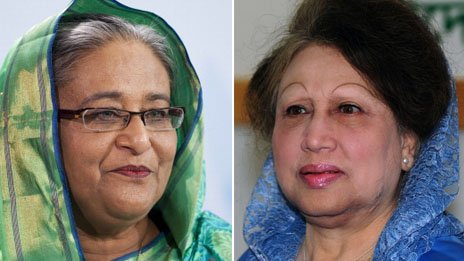
Bangladesh will hold its 10th general elections on 5 January amid serious questions over the credibility of the electoral process.
The main opposition Bangladesh Nationalist Party (BNP) and its allies have decided to boycott the elections over the governing Awami League’s reluctance to form a neutral government to oversee the process.
The opposition demanded that Prime Minister Sheikh Hasina must step down and form a caretaker neutral government before elections are held in Bangladesh.
The government, however, has rejected the demand, saying the elections are a constitutional necessity and will be held on 5 January.
What is at stake?
The credibility of Bangladesh’s election process has come under scrutiny because the Awami League (AL) is expected to secure a landslide win in the absence of a credible opposition. The United States and the European Union have refused to send observers, further raising questions over the electoral process.
Containing violence on the election day will be another serious challenge for the government because several parts of the country, including the capital Dhaka, have witnessed fatal clashes between political workers of the two parties in the past few weeks.
Why is the BNP not participating?
Bangladesh has traditionally held general elections under a neutral caretaker government to ensure a free and fair process. But the Awami League government amended the constitution and decided to hold elections under an all party government. Former Prime Minister and BNP chief Khaleda Zia says such a government will in affect be headed by the governing party which will undermine the fairness of the process.
What will be the impact?
In the absence of any opposition, the Awami League and its allies are likely to win at least 154 unchallenged seats out of 300 and this will help them in securing a comfortable majority.
But pundits are predicting further chaos in the country as opposition parties are likely to continue with their protests which often turn into violent clashes with security forces.
Who are the main protagonists?
Prime Minister Sheikh Hasina and BNP leader Khalida Zia – who are bitter political enemies – have alternated from government to opposition for most of the last two decades. In the current scenario, their rivalry is likely to reach a feverish pitch after the elections.
Former president Hussain Muhammad Ershad and his Jatiya Party (JP) have also emerged as key players in these elections.
The JP is the third largest party after Awami League and the BNP and has maintained a sizeable presence in parliament.
A U-turn by Mr Ershad over his party’s participation in the elections has further complicated the situation.
He first announced in October that his party will not participate in the vote, only to reverse his position and declare in November that he will join an all-party caretaker government to ensure a free and fair ballot.
But he once again went back on his words and informed the Election Commission on 12 December that his party will boycott the elections.
 Bangladeshi garment factory workers have been protesting against poor working conditions and low wages
Bangladeshi garment factory workers have been protesting against poor working conditions and low wagesWhat are the main issues?
Political stability has become a key issue because the country has seen regular strikes and violence in the run up to the elections. Unemployment, poverty, corruption, rising food prices, industrial accidents and human rights violations are other key issues.
On 24 April, Bangladesh witnessed one its worst industrial disasters when an eight-storey garment factory building near Dhaka collapsed killing more than 1,000 people. Bangladesh has one of the largest garment industries in the world, but fails on industrial safety standards.
Safety and wages of garment factory workers are also among the key issue in these lections.
A survey conducted by The Asia Foundation in September 2013 showed that more than 75% of voters preferred the elections to take place under a neutral caretaker government. Commentators say it will be interesting to note the voter turnout under the current circumstances.
The ban imposed on the Islamist party, Jamaat-e-Islami, will be another factor in these elections. Senior Jamaat leader Abdul Kader Mullah was executed on 13 December after his conviction for crimes during the 1971 war of independence. His execution was a watershed moment in the country’s short but often bloody history.
The execution sharply divided opinions and resulted in violent clashes across the country.
What are the geopolitical implications of the polls?
The US, the EU and Russia have refused to send observers to Bangladesh and this has seriously dented the country’s image and its ability to manage its foreign relations. Many international observers are critical of the polls because the unchallenged 154 seats will give a comfortable majority to the Awami League and this does not reflect people’s will – a fact the international community may find difficult to live with.
Analysts are also keeping a close eye on neighbouring India’s response to the polls because Delhi has traditionally enjoyed a healthy relationship with the Awami League.
How long will it take for the votes to be counted and will turnout be low because of the opposition boycott?
Bangladesh has more than 81 million registered voters and the turnout was above 70% in the 2008 parliamentary elections.
But it is expected to be significantly less in 2014 as 154 out of 300 seats are going uncontested.
In 2008, the results were announced within 48 hours after the polling. The declaration of results in 2014 is largely insignificant as the AL is set to register a landslide win.
The announcement in 2014 will also depend on how peacefully the polling – many votes are now counted electronically – is conducted.
Source: BBC









